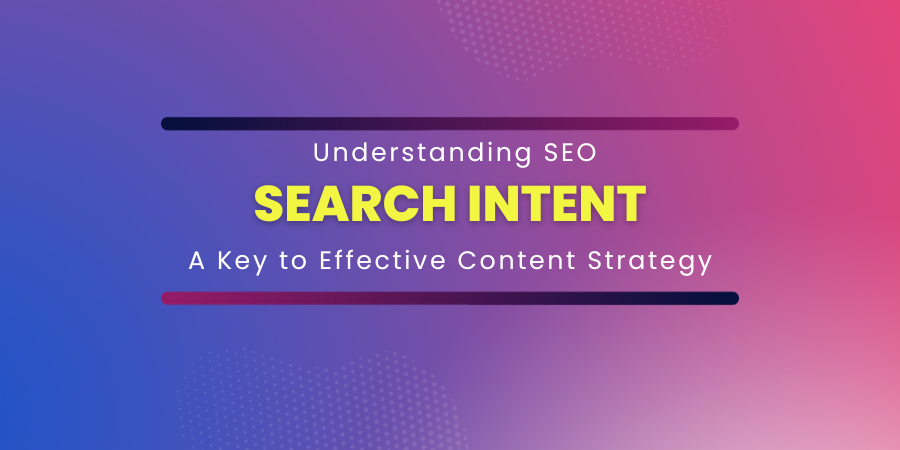Understanding SEO Search Intent: A Key to Effective Content Strategy
Marketing Strategy Inbound Marketing SEO Sep 20, 2023 9:31:00 AM Amanda Martin 3 min read

SEO, or Search Engine Optimization, is the practice of increasing the quantity and quality of traffic to your website through organic search engine results. One of the primary elements of SEO that often goes under appreciated is search intent, which is the ‘why’ behind a user’s specific search query.
In this blog, we will delve into the concept of search intent, why it’s crucial when crafting SEO content, and how you can effectively incorporate it into your content strategy.
What is Search Intent?
Search intent, also referred to as "user intent" or "keyword intent", refers to the main goal a user has when typing a query into a search engine. Essentially, it is what the searcher hopes to achieve as a result of their search. This could range from seeking information or answering a question, to making a purchase or exploring a topic of interest.
There are typically four types of search intent:
-
Informational Intent: The user is seeking information or an answer to a specific question. For example, “What is the capital of Canada?”
-
Navigational Intent: The user wants to reach a particular website or page. For instance, entering “Facebook” into Google suggests the user wants to navigate to Facebook's site.
-
Transactional Intent: The user aims to buy something or complete a transaction. An example might be searching for “Buy iPhone 13 online.”
-
Commercial Investigation: The user wants to compare and review products or services before making a purchasing decision, such as “Best DSLR cameras 2023.”
Why is Search Intent Important for SEO?
Understanding search intent is crucial for SEO because it aligns your content with your users' needs. This is especially vital considering that Google’s algorithms have evolved to prioritize search intent. With the introduction of the BERT update in 2019, Google became significantly better at understanding the context of words in a search query, making it more intent-focused.
Meeting search intent can positively impact your SEO in various ways:
-
Improving Click-through Rates (CTR): If your content matches the search intent, users are more likely to click on your page in the search results, which can increase your CTR.
-
Lowering Bounce Rates: When your content satisfies the user's search intent, they're more likely to stay on your page, reducing your bounce rate.
-
Increasing Dwell Time: If a user finds your content helpful and engaging, they'll likely spend more time on your site, increasing your dwell time—a factor Google may consider when ranking your page.
How to Craft Content Around Search Intent
-
Identify the Intent: Start by identifying the search intent of your target keywords. Analyze the search results for these keywords to understand what content Google considers relevant. For instance, if most results are blog posts, the intent is likely informational. If they're product pages, the intent is probably transactional.
-
Create Matching Content: Once you’ve determined the search intent, create content that aligns with it. For example, if the intent is informational, create detailed guides or how-to articles. If it’s transactional, create strong product pages with clear CTAs.
-
Consider SERP Features: Pay attention to the search engine results pages (SERPs) features for your target keywords. If you see features like "People also ask" or featured snippets, it's a good indication that you should structure your content to answer questions clearly and concisely.
-
Optimize Accordingly: Lastly, optimize your content for your target keywords, but remember to stay focused on the user. Include relevant keywords naturally, and make sure your meta title and description accurately reflect the content of the page.
In summary, search intent is a fundamental aspect of SEO. By understanding what users are looking for and delivering content that meets their needs, you'll improve your chances of ranking higher in search results and attracting more traffic to your site. The key to crafting effective SEO content lies not just in targeting keywords, but in satisfying search intent.

Amanda Martin
A passionate eco-warrior and aspiring real-life Captain Planet, Amanda blends her commitment to a sustainable future with her remarkable knack for marketing engagement. With notable experiences working with giants like Tequila Patrón, Toyota, and Honda Performance Development, she has also been recognized for her artistic eye, with her photography gracing the pages of Sports Illustrated.
When she's not championing a greener planet or turbocharging marketing campaigns, Amanda finds solace in fantasy novels, and she's fervently drafting her blueprint for a sustainable living community. A sports enthusiast, she eagerly tunes into Formula 1, NHRA, cheers for the Atlanta Braves, and the Nashville Predators.
